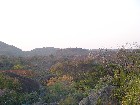
Vaughn Climenhaga
Associate Professor
Department of
Mathematics
University of Houston
About me
Research and other good stuff
Teaching
|
Houston
Workshop on Hyperbolic Dynamical Systems
From May 19-22, 2022 (Thursday-Sunday), the Department of Mathematics at the University of Houston will host a research workshop on topics related to hyperbolic dynamical systems, including non-uniform and partial hyperbolicity, statistical properties, thermodynamic formalism, rigidity, and connections to geometry. The interaction between different approaches to the study of hyperbolic systems will be of particular interest. The workshop will be preceded by a day of preparatory activities on May 18 (Wednesday) targeted primarily at graduate students. The goal of these activities will be to introduce some of the fundamental ideas that will appear throughout the research talks at the workshop and to prepare the students to engage with the results that are presented at the workshop itself, as well as to build community among graduate students working in this area, as we seek to strengthen professional networks that have been weakened by the pandemic. Workshop speakers include:
If you plan to participate in the workshop, please fill out the following registration form to ensure that you receive up-to-date information about logistics and schedule. At this point we do not expect to be able to make any new promises of travel support, but we welcome further registrations from anyone who has another source of funding. If you have questions, please contact Vaughn Climenhaga at climenha@math.uh.edu. Hotel: If we are funding your travel, then we have made a reservation for you at the workshop hotel, which is the InterContinental Houston - Medical Center at 6750 Main St. If you are funding your participation from other sources, then you will need to make your own lodging arrangements: we recommend one of the following options.
Getting to campus: The workshop will be held in the Science and Engineering Classroom building (SEC) at the University of Houston, which is several miles from the hotel. The number 4 bus runs between the Medical Center (where the hotel is) and campus. It should take about 30-35 minutes to get from the hotel to campus -- see the following: The bus runs every 10 minutes on weekday mornings, and every 17 minutes on weekend mornings. You can pay for the bus using the Metro "Q Ticketing" App or via cash ($1.25, exact change only). Another option is "Metro Q Cards" but none of the places where you can purchase these seem to be convenient to the airport or hotel. An Uber/Lyft between the hotel and campus should take about 20 minutes and cost $12-15. Restaurants: Here
is a list of some restaurants both on
campus and near the hotel.
Most of the workshop activities will take place in SEC 100 (Science and Engineering Classroom building), which is just across Cullen Blvd from the bus stop (on Holman St.). Parallel sessions and grad student problem sessions will take place upstairs in SEC 201-203.
Here
are some exercises that were distributed
to graduate students during the preparatory
sessions. Some
notes from our 2019 summer school that
might be useful for undergraduates and other
students attending the workshop. This workshop is supported by NSF grant DMS-1554794.  |
|||
- May
30-June 6, 2019 (Includes videos of lectures)
- May 16-24, 2018 (Includes videos of lectures)
- May
17-25, 2017 (Includes videos of lectures)
- May
18-26, 2016 (Includes videos of lectures)
- May
20-28, 2015
- May 14-23, 2014 (Includes lecture notes)
- May
13-21, 2013